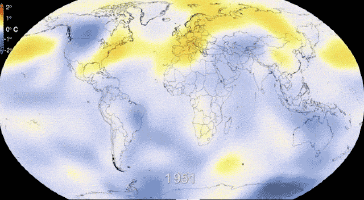Ah, allergy season. ‘Tis the season of not finding Mucinex on the shelves, pumping your nostrils with god-awful nasal sprays, and the endless supply of tissues stored in your backpack. Don’t worry, you’re not alone: over 50 million people in the United States experience allergies.

Gif courtesy of giphy.com
But doesn’t it seem like allergy season drags out longer and longer each year? Did you ever think that it may have something to do with your age? Maybe you experienced an allergy hike during puberty. Or maybe you’re worried you’ll develop some weird allergy out of the blue. I’m coming at you with another science lesson to help you understand your least favorite seasonal pest.

Gif courtesy of giphy.com
What Is An Allergy?
To clear up some confusion, an allergy is the response of the body’s immune system to normally harmless substances, such as pollens, foods, and house dust mite. An allergen is what you are actually allergic to. They are the reason for your short demise and headaches. Some people may be diagnosed with chronic allergies and some people have seasonal. The determining factor isn’t as simple as you think.

Gif courtesy of giphy.com
Allergies are super complex, and often come and go. We do know that sufferers produce this antibody given the fancy name: Immunoglobulin E. IgE is responsible for the chain reaction of sneezing, coughing, and teary eyes.
IgE antibodies bind to the surface of cells in the body called mast cells which become ‘IgE-sensitized.’ These are the cells that then identify particular allergens the next time they come in contact with the body. This process is called sensitization.

Gif courtesy of giphy.com
People tend to experience allergies, if they weren’t already born with them, between the ages of six and 15 and again after the age of 30. Weird right? WRONG. I’m about to connect the dots as to why your 15-year-old body is very similar to an 80-year-old body.
Your Immune System Is Dying?
Yes and no. When you’re young, your little immune system is an environment that is very familiar to you for the first couple of years in your life. This is why you may have always been a victim of sneezing at home, but now that you’re at college, you may not be sneezing as much.
When you get to the age that you venture out (usually when you’re a teenager), your immune system is introduced to a wave of new bacteria, viruses, and allergens. Since you are being introduced to so many viruses, your body starts producing an insane amount of IgEs. This, in turn, reduces your allergy symptoms.

Gif courtesy of giphy.com
When you graduate college, you are most likely no longer in an environment with tiled floors and cleaned classrooms. Your body is reintroduced to dust mites and pollen in your rented apartment or you move back home and the allergies you had when you were five are now allergies you have at 25.
This is also around the time that you are having kids, and with kids comes colds and infections that weaken the immune system and result in allergens affecting your body, which essentially means your “death” is here.

Gif courtesy of giphy.com
#ScienceFact: A weakened immune system is also prevalent in recently pregnant moms and people who are ill. If you are taking a lot of medication, allergic reactions occur at a higher rate as well.
So You Don’t Believe in Climate Change?
Dr. Jordan Josephson, an otolaryngologist at Lenox Hill Hospital in New York City says, “Allergens are getting worse and worse. There are things called superantigens, which means that all the car exhaust and pollution that can link up with maybe mold and are creating super-antigens that people are more allergic to.” Dr. Josephson mentions that global warming may play a part. As the climate of our planet shifts and our weather patterns change, allergen strains tend to become more potent.

Gif courtesy of giphy.com
The rise of CO2 levels and temperature has a direct correlation to the plant pollination cycles becoming longer and longer, as well as more intense. This was seen in the U.S. where record temperatures went hand-in-hand with record pollen counts, and with that, record allergy suffering. Warm temperatures and high CO2 are ideal growing conditions for all plants. Allergenic plants, such as grasses and weeds are the fastest growing and most adaptable so in turn pollen levels and common allergies rise in correlation.
With this plant rise, it isn’t weird that many more people are now noticing allergies they may have never had before. So, if you’re 30 and you’ve recently developed an allergy to ragweed, start joining Leo and advocate for climate change.

Gif courtesy of giphy.com
How Can You Help Reduce Your Allergies?
If you want to sneeze less or help prevent the development of certain allergies there are some things you can do, follow these simple guidelines.
By planting brightly colored flowers, you can reduce the amount of pollen entering your nasal passages. Brightly colored flowers typically rely on insects to pollinate not the wind, which means the pollen is too big to enter your nose. You could ask your doctor about certain medications to take to reduce your symptoms or to take in precaution in efforts to “stop” allergies.
The sad reality is that there is little we can do to prevent the attack of allergens. My only advice is to stay on top of your allergies and to stick by your nasal sprays and decongestants (don’t forget the tissues). They will be your best friends when trying to breathe.

Gif courtesy of giphy.com


